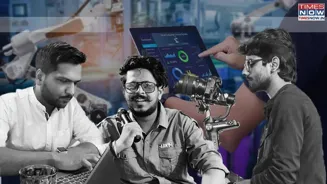For many Indians, engineering is often seen as a dream since childhood; for some it is also their family's shared dream. India has always been a country
that has put engineering and medicine professions on pedestal. It is often seen as the golden path to stability, prestige, and financial security. However, things seem to be changing in the recent past. Not that the number of engineers or engineering colleges have reduced, but lately engineering graduates seem to be choosing paths far removed from their core training such as media, analytics, photography and more. Take RJ Ankit Singh, for instance. Born in a Bihari family settled in Kanpur, Ankit was a high achiever from the start, scoring 9.4 CGPA in Class 10 and 79 per cent in Class 12. With a silver medal in mechanical engineering from Dr. Virendra Swaroop Group of Institutions, it looked like Ankit will take up a well-paying engineering job. But life had something else in mind. Family expectations had kept him from opting for arts, and conventional career choices weighed heavily. At one point, he had to pick between a paid internship at Hindustan Aeronautics Limited and an unpaid one at a Kanpur radio station. He chose microphone over machinery. What followed was a series of experiments: a stint in Microsoft’s consumer tech support BPO, a short phase as a school teacher, and even attempts at competitive exams like UPSC CAPF and Navy (where he was declared medically unfit). “Life felt stuck,” he recalls. The turning point came when Ankit grabbed a microphone during college events. Hosting shows, anchoring, and engaging with an audience gave him a new identity. “It was because of my fun days in Engineering that I got to know that I am good with a mic," he says. This discovery pulled him toward the world of media. He got job offers from Radio Mirchi and Fever 104 FM. Slowly, he built his path into the news industry, where he now works as a producer at a media company. Aayush Nassa, a Chemical Engineering graduate from Thapar University, shares a similar story. Placed on-campus at Reliance Refineries, he opted for a career in analytics and consulting. “It wasn’t about money. Core roles felt slower in progression. Analytics allowed me to experiment, learn, and solve problems daily,” he explains. Sanchit, who completed his BCA from Patna-based St. Xavier’s College, and later pursued an MCA through distance learning, had always wanted to pursue photography. Like many others, family pressure nudged him into the IT path. In fact, seeing his growing interest in photography, the principal once offered to transfer him into the Mass Communication course. But family pressure forced him to continue with BCA. He eventually embraced his passion, starting his own photography company. There are many more like Aayush and Ankit who shift from engineering jobs, despite having successful degrees.
What's lacking?
But why are engineers shifting away from core jobs? Many engineers think that engineering education often fails to keep pace with industry demands. Many graduates find themselves trained in outdated formulas rather than modern tools, which often forces young achievers to pivot to sectors with more opportunities and faster growth.
"We would memorise long empirical formulas, while in practice the industry had moved to software and automation. This gap wasn’t just in chemical engineering. Even in computer science, which had the best placements, there was a mismatch. We were taught C, which is primitive compared to what’s actually used (Python, SQL, Java)," he recalled. "In fact, companies rarely cared what exact language you knew. They tested problem-solving skills, often in Python or Java, and students prepared for that on their own. Even today, when I write SQL or Python code, the logic and aptitude trace back to my engineering days. The language has changed, the tools have changed, but the foundation is the same. That made me realize the truth: the most important skill is how you learn and adapt."
However, he quickly adds that while the curriculum might not be matching upto industry standards, the life skills students are taught in these colleges act as building blocks. "Companies tested problem-solving skills, often in Python or Java, and students prepared for that on their own. That made me realize the truth: the most important skill is how you learn and adapt," Nassa added.
Some graduates have also flagged lack of opportunities in the 'not so popular' branches of engineering and colleges. Many have experienced that limited placement opportunities often push capable students toward non-core careers, regardless of their interest or talent. "Branches like Electrical and Mechanical demand very high percentages. The top scorers go to IITs and NITs, so big companies only visit those campuses for placements. In our college, we never got that chance," recalled Amit, an Electrical and Electronics Engineering graduate from SRM University (2016–2021).
"We had campus placements, and mainly two companies visited our campus. One company had such a tough technical round that most students couldn’t crack it, while the other offered BPO jobs under the false impression of technical support roles. They made false promises that after a few months of training, students would be given better salaries and designations," another Computer Science Graduate from Pune shared. She now serves as a teacher in a reputed CBSE School.
Another big reason behind this shift is the imbalance between demand and supply of core engineering jobs. . While lakhs of engineers graduate every year, the number of core engineering jobs that come with a good pay scale and work-life balance are very limited. "Unless you crack one of the few core companies that visit campus, you’re left with limited options, which are often at a low CTC compared to the high fees in private institutes. When you fresh out of colleges, you are chasing that lifestyle for which you are stuck in the high CTC rat-race. Consulting, IT, and analytics firms hire in bulk, so naturally many engineers switch," said an NIT graduate.
Despite leaving their core field, graduates credit engineering with shaping problem-solving skills, discipline, and adaptability. “Even if the formulas I learned aren’t used now, the grind gave me a mindset to solve problems,” says Aayush.
As India celebrated Engineers’ Day yesterday, these stories underscore a crucial lesson: while engineering equips students with essential skills, it doesn’t have to define their career. From machines to microphones to cameras, the detours often lead graduates to where their true passions lie.












